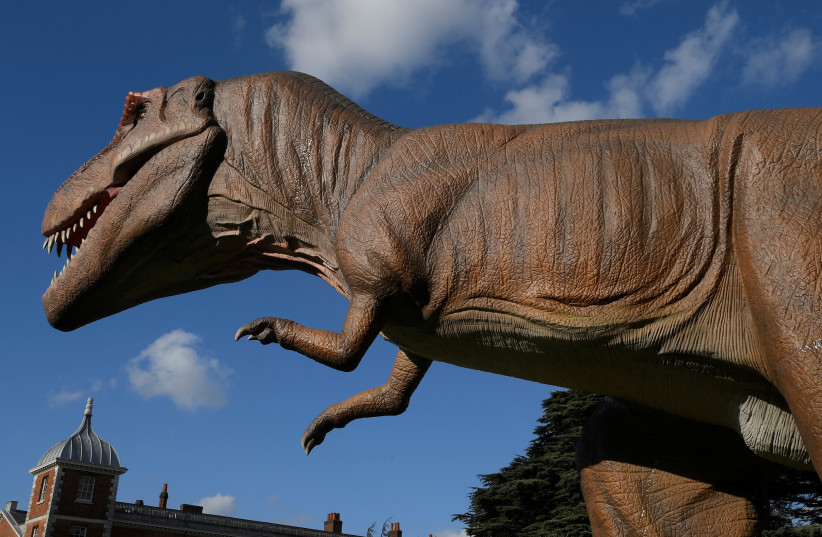Study results show that the dinosaurs' biodiversity was already in steep decline some 10 million years before an asteroid hit the Yucatán peninsula in Mexico.
By TAL SPUNGIN
AUGUST 15, 2021

A life-size dinosaur is seen at Jurassic Kingdom in London
(photo credit: TOBY MELVILLE/REUTERS)
A period of global cooling caused a steep decline in the number of dinosaur species some 10 million years prior to the extinction event caused by an asteroid, according to a June study.
The study, published in Nature Communications, was the product of an international collaboration featuring paleontologists from Université de Montpellier in France, the University of Bristol in the UK, and the University of Alberta in Canada.
Approximately 66 million years ago, a 12 km. wide asteroid crashed into the Yucatán peninsula in Mexico, starting a nuclear winter that caused the extinction of the dinosaurs.
The team of researchers focused on six dinosaur families, three carnivores and three herbivores, that survived 40 million years of evolution up until the asteroid hit Earth. They examined fossils from over 1,600 individual dinosaurs of around 250 different species in total.
Results show that the biodiversity of the six families was already in steep decline, some 10 million years before the asteroid hit. The studies' findings are significant, as the decline in biodiversity of dinosaurs can be seen worldwide, in both herbivorous and carnivorous species.
Interestingly, the one family to show only a small decline in biodiversity prior to the asteroid was the Troodontidae, a family of bird-like dinosaurs. Birds are known to have an evolutionary connection to dinosaurs.
The researchers noted that the herbivorous dinosaurs declined in number slightly before the carnivores, making it highly probable that the decline of herbivorous species directly caused the decline in carnivorous species.
This is an example of the cascade effect, where extinction is triggered by a prior extinction of a different species in an ecosystem.
One theory for why dinosaurs were declining in numbers prior to the extinction event is climate change. During the Cretaceous period, between 145.5 and 65.5 million years ago, the Earth underwent a global cooling period of 7-8⁰ C.
Dinosaurs, who were mesothermic animals - meaning they needed a warm climate to maintain body temperature and functionality of their metabolism, must have been severely impacted by this global cooling period.
New information on dinosaurs, as well as fossils, is being discovered every day. In June, scientists discovered a new species in Australia.
No comments:
Post a Comment